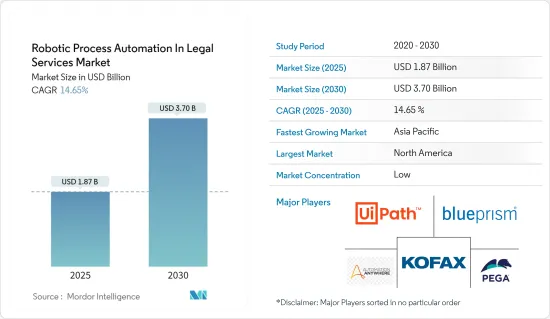PUBLISHER: Mordor Intelligence | PRODUCT CODE: 1636431

PUBLISHER: Mordor Intelligence | PRODUCT CODE: 1636431
Robotic Process Automation In Legal Services - Market Share Analysis, Industry Trends & Statistics, Growth Forecasts (2025 - 2030)
The Robotic Process Automation In Legal Services Market size is estimated at USD 1.87 billion in 2025, and is expected to reach USD 3.70 billion by 2030, at a CAGR of 14.65% during the forecast period (2025-2030).

Robotic process automation (RPA) has significantly advanced, particularly in the legal services sector. RPA involves deploying software robots or intelligent automation tools to handle repetitive, rule-based tasks that were traditionally human-performed. In legal settings, RPA plays a pivotal role in streamlining operations, cutting down on errors, boosting efficiency, and liberating time for legal experts to tackle more intricate, strategic endeavors.
Over the years, the legal services market has seen a steady uptick in RPA adoption. Law firms and legal departments are leveraging RPA to automate tasks like document review, contract management, legal research, and compliance processes. By automating these tasks, RPA not only slashes costs but also frees up time, empowering legal professionals to focus on higher-value endeavors. The RPA landscape in legal services is witnessing heightened competition, with a multitude of tech vendors tailoring RPA solutions explicitly for the legal domain.
Robotic Process Automation In Legal Services Market Trends
Rise in Software Technology
Robotic process automation (RPA) employs software robots or intelligent bots to automate repetitive tasks in business processes. These bots are designed to mimic human actions and interface with diverse software applications, aiding organizations in operational streamlining and efficiency enhancement. Within the legal services sector, RPA is poised to revolutionize pivotal functions such as contract management, document review, legal research, compliance, and regulatory processes. Automating these routine tasks through RPA allows legal professionals to pivot their attention to strategic initiatives. By integrating advanced technologies such as machine learning and natural language processing (NLP), RPA bots can not only understand legal documents but also extract vital information and execute actions with minimal human involvement. As software technology progresses, RPA solutions are increasingly scalable and adaptable to meet evolving business needs.
Rise in Robotic Process Automation in Legal Services Market in North America
Robotic process automation (RPA) leverages software robots and artificial intelligence (AI) to streamline repetitive and rule-based tasks, especially within the legal sector. The increasing prominence of law firms is propelling the adoption of RPA in the legal services market. To boost productivity and profitability, top clients of law firms commonly target reducing legal expenses. Notably, the United States stands out as the primary hub for legal services in North America. As the legal services landscape evolves, its trajectory will be significantly shaped by the escalating integration of cutting-edge technologies. Today, businesses can efficiently assess contracts in bulk and conduct more precise data analyses, all thanks to AI. Furthermore, AI's capabilities extend to predicting legal case outcomes. A pronounced emphasis on transparent client interactions is poised to fuel market expansion.
Robotic Process Automation In Legal Services Industry Overview
Several players operate within the robotic process automation (RPA) sector of legal services, leading to a fragmented landscape. Noteworthy international entities such as UiPath, Blue Prism, and Automation Anywhere, alongside Kofax, Pegasystems, NICE, IBM, and others like WorkFusion, EdgeVerve, and Kira Systems, are highlighted in the report. Presently, a handful of key players hold significant market shares. However, propelled by technological advancements and innovative strategies, mid-sized and smaller firms are carving out their niches, securing fresh contracts, and exploring untapped markets.
Additional Benefits:
- The market estimate (ME) sheet in Excel format
- 3 months of analyst support
TABLE OF CONTENTS
1 INTRODUCTION
- 1.1 Study Assumption and Market Definition
- 1.2 Scope of the Study
2 RESEARCH METHODOLOGY
3 EXECUTIVE SUMMARY
4 MARKET DYNAMICS
- 4.1 Market Overview
- 4.2 Market Drivers
- 4.2.1 Digital Transformation Initiatives is Driving the Market
- 4.3 Market Restraints
- 4.3.1 Concerns Related to Data Security, Privacy is Restraining the Market
- 4.4 Market Opportunities
- 4.4.1 Collaboration with Artificial Intelligence and Machine Learning Technologies
- 4.5 Value Chain / Supply Chain Analysis
- 4.6 Porter's Five Forces Analysis
- 4.6.1 Threat of New Entrants
- 4.6.2 Bargaining Power of Buyers/Consumers
- 4.6.3 Bargaining Power of Suppliers
- 4.6.4 Threat of Substitute Products
- 4.6.5 Intensity of Competitive Rivalry
- 4.7 Insights on Technological Innovations in the Market
- 4.8 Impact of Covid-19 on the Market
5 MARKET SEGMENTATION
- 5.1 By Deployment Mode
- 5.1.1 On-premise
- 5.1.2 Cloud
- 5.2 By Solution
- 5.2.1 Software
- 5.2.2 Service
- 5.3 By Geography
- 5.3.1 North America
- 5.3.1.1 United States
- 5.3.1.2 Canada
- 5.3.1.3 Rest of North America
- 5.3.2 Europe
- 5.3.2.1 Germany
- 5.3.2.2 United Kingdom
- 5.3.2.3 France
- 5.3.2.4 Russia
- 5.3.2.5 Spain
- 5.3.2.6 Rest of Europe
- 5.3.3 Asia-Pacific
- 5.3.3.1 India
- 5.3.3.2 China
- 5.3.3.3 Japan
- 5.3.3.4 Rest of Asia-Pacific
- 5.3.4 South America
- 5.3.4.1 Brazil
- 5.3.4.2 Argentina
- 5.3.4.3 Rest of South America
- 5.3.5 Middle East and Africa
- 5.3.5.1 United Arab Emirates
- 5.3.5.2 Saudi Arabia
- 5.3.5.3 Rest of Middle East and Africa
- 5.3.1 North America
6 COMPETITIVE LANDSCAPE
- 6.1 Market Concentration
- 6.2 Company Profiles
- 6.2.1 UiPath
- 6.2.2 Blue Prism
- 6.2.3 Automation Anywhere
- 6.2.4 Kofax
- 6.2.5 Pegasystems
- 6.2.6 NICE
- 6.2.7 IBM
- 6.2.8 WorkFusion
- 6.2.9 EdgeVerve
- 6.2.10 Kira Systems*
7 MARKET FUTURE TRENDS
8 DISCLAIMER AND ABOUT US




